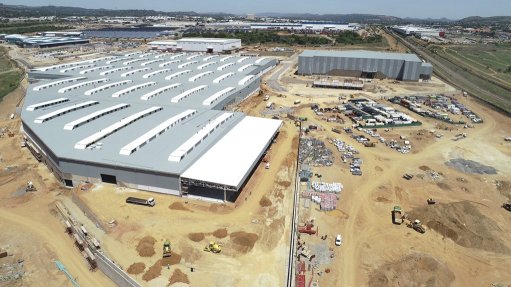
ARIEL VIEW OF TASEZ PHASE 1 Zutari has provided engineering service for the project
Consulting engineering and infrastructure advisory firm Zutari has expanded and updated the traffic impact assessment (TIA) for the larger Tshwane area affected by the development of the Tshwane Automotive Special Economic Zone (TASEZ).
The TIA indicated that eight major road intersections must be upgraded.
Zutari was appointed in March 2020 to provide civil engineering services for Phase 1 and Phase 1A of the TASEZ.
Services included the design, tendering and overall construction management of water and sewer bulk infrastructure; bulk earthworks, which included the required retaining walls, external roadworks upgrades and stormwater drainage; as well as all the in-house services for the project.
Both phases were greenfield at the stage of Zutari’s appointment. At the time, some preliminary investigations – such as a TIA for part of the area and a bulk services investigation report, as well as a preliminary geotechnical investigation report – were in place, which the company could leverage, explains Zutari professional civil engineering technologist Jaco Kriek.
The water use licence has been approved, which was assisted by Zutari submitting the required designs to the Department of Water and Sanitation.
The designs, tendering and construction of earthwork platforms and retaining walls for both phases, and the designs and tendering for external roads with the associated stormwater and bulk water supply, are complete, and construction has started. Zutari has provided full-time site supervision and site administration.
The designs and tendering of in-house services for both phases, such as sewer, water, fire water, roads and stormwater, were completed with Zutari also providing full-time site supervision and administration. Construction has started, with Phase 1 close to completion. Top structure construction of most suppliers are well advanced and some are operational.
The designs of the intersection upgrades are complete and construction is expected to begin in the near future.
Challenges
Kriek says the Covid-19 lockdown started a day after Zutari joined the project, which was challenging for the Zutari team, as well as other roleplayers, because they had to work remotely and coordinate among various design disciplines.
Zutari also had to coordinate with the implementing agent and roleplayers, such as City of Tshwane officials, throughout the development of the project.
“The fast-track nature, with tight deadlines for deliverables, necessitated that Zutari had to use a large design team for the project that is 100% dedicated to the timeous delivery of milestones,” adds Kriek.
As roleplayers and engineers for the supplier sites came on board, coordination became more challenging. Numerous redesigns had to be done to accommodate all the requirements within the original time allowed for the programme.
Another challenge was that tenders had allowed for 45% of the estimated contract value, for each individual package, to be dedicated to small, medium- and microenterprise contractors. This required careful planning in terms of splitting bills of quantities and writing the tender documents, explains Kriek.
Zutari also had to get assistance from a dedicated geotechnical engineer from another company when the on-site material was found to be of inconsistent quality during the earthwork platform construction.
Zutari addressed the various challenges and ensured that the project continued smoothly.
“Production and manufacturing facilities such as the TASEZ, with significant commitment and investment from the likes of Ford, and partnership agreements with government entities, create an environment for local manufacturing to be rekindled,” concludes Zutari built environment head Deon Pretorius.